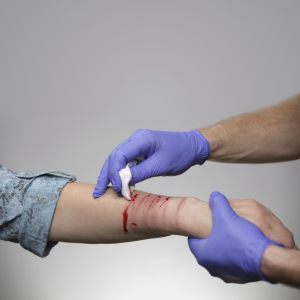 There are a number of circumstances that may lead you or someone you love to harm themselves (or engage in what psychiatrists sometimes cal self injurious behavior or SIB) Today’s post will talk about what self-harm is exactly, why you or your loved one may be self-harming, and what you can do.
There are a number of circumstances that may lead you or someone you love to harm themselves (or engage in what psychiatrists sometimes cal self injurious behavior or SIB) Today’s post will talk about what self-harm is exactly, why you or your loved one may be self-harming, and what you can do.
It’s important to note that today’s post is taken directly from an awesome Twitter chat run by Hannah Stein (@hanahjewcy) under #SolidarityChat on 3/21/16. We really want to credit Hannah and the chat participants for bravely sharing their insights and allowing us to repost them here. So let’s get to it…
What is Self-Harm?
Self harm is intentionally inflicting bodily or emotional injury on oneself, without the intent to die or commit suicide. The most used method of self-harm is “cutting” but it’s important to remember that there are other forms of self harm as well, including eating disordered behavior, burning, pinching, drinking, and even sex can be used as a form of self harm. Simply put, self-harm or SIB is engaging in any behavior that intentionally causes harm to yourself.
Why Do People Harm Themselves?
Self-harm is so commonly misunderstood, which can lead to further isolation, deterioration, and secretive escalation self-harming. Oftentimes people who engage in self harm are met with misunderstanding or judgement when what they really need is help and compassion!
Hannah puts it wonderfully when describing why someone may engage in self harm:
“A lot of us know the physical signs of self harm or SIB– cuts, bruises, bald spots– but what we don’t see is just as dangerous. What goes on in the mind that leads people to cut is important. Cutting is rarely a sign of being suicidal– it usually serves the opposite. It’s a way to show you’re alive, a way to regain control over a seemingly uncontrollable circumstance or mental illness.”
It's also important to note that self-harming isn't dramatic. It's a serious cry for help. Sometimes it serves as "proof" for the suffering
— Hannah Stein (@hannahjewcy) March 21, 2016
It’s also important to note that self-harming isn’t “dramatic”. It’s a serious cry for help. Sometimes it serves as “proof” for the suffering one endures emotionally. A way of saying “I’m going to hurt myself on the outside to show how much I hurt on the inside.”
There can be many reasons you or someone you love may be engaging in self-harm. Some people harm themselves as a way to numb the pain they feel after a traumatic event or to feel like they’re in control. For others, self-harm is a way to release feelings or emotions they may not be able to articulate. To regain control over SIB it will become important to understand your own reasons for engaging in self-harm.
Asking for Help
It’s important to understand that asking for help is a sign of strength! It is not a weakness. It’s also not selfish to ask for help. Taking care of you means taking care of your mind, body, and spirit so don’t be afraid to ask for help.
How to Help Someone Who is Struggling with Self Harm or Self Injurious Behavior
I love hannah’s response to this question “My biggest piece of advice? COMPASSION > JUDGMENT. Not knowing what to say is not an excuse to leave someone in the dark.” If you have struggled with self-harm you may have experienced people, even providers walking away because they don’t know how to handle self-harming. If you’re struggling with self -harm, know you are worthy. If you love someone who is engaging in self-harm and she doesn’t accept help today, don’t walk away. It’s okay to say you don’t know what to do. People who are self-harming often feel completely alone, so just letting someone know they’re not alone, is incredibly meaningful. Don’t ignore self-harm because you don’t know what to do. Approach your loved one with love and support and encourage her to seek psychiatric treatment. If your loved one doesn’t accept help today, show her this post tomorrow, or Hannah’s twitter chat, but don’t give up on her.
Hannah reminds us that “it’s important to just remind your loved one that you’re there if even just to listen and that they aren’t an inconvenience.”
Recovery from self-harming behavior and its causes is possible. Treatment is just as unique as the individual in need of recovery, but you are worth it.
My name is Amanda Itzkoff, MD. I am a New York City based Psychiatrist and Assistant Professor at Mount Sinai Medical Center.
For additional information, please feel free to email our office at Amanda.Itzkoff@gmail.com.
To schedule an appointment, call our offices at 917-609-4990.
Be well,
Dr. Amanda Itzkoff

